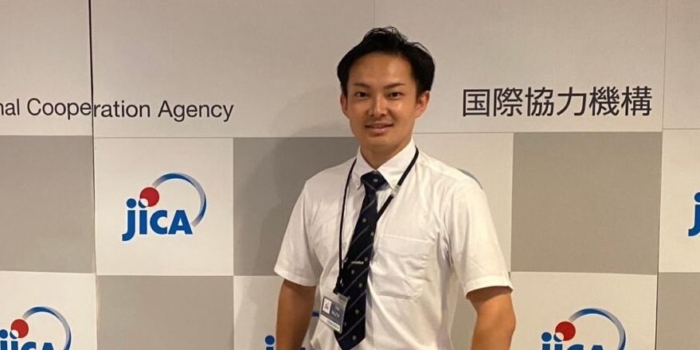Message from Dr. Albert BYAMUGISHA
I started my PhD program under the supervision of Professor Keiichi Ogawa in GSICS at Kobe University in 2009 and graduated in 2012. During the time of study, I enjoyed...
Graduate School of International Cooperation Studies (GSICS), Kobe University


From August 15 to September 4, 2024, I had the opportunity to participate in the JICA Internship Program at Sanyu Consultants Inc. This intensive 18-day practical experience provided me with valuable practical knowledge and skills in the field of international cooperation. During this internship, I had the chance to be involved in a country-specific training program, conducted as part of the Local Administration Capacity Building Advisor Project in Mali (MALICOT), commissioned by JICA to Sanyu Consultants Inc. My responsibilities during the internship included:
Through this internship, I gained a wealth of knowledge and made several important discoveries.
First, I deeply recognized the importance of citizen collaboration in local administration. It was impressive to see Malian government officials grasp this concept from Japanese case studies and explore how to apply it in their own country. Particularly through case studies in Takikawa City and Urahoro Town, they acknowledged that the proactive participation of local residents is crucial in delivering effective administrative services with limited resources and incorporated this understanding into their concrete action plans. This insight provided significant implications for promoting parental and community participation in school management, which aligns with my research in the field of education.
I also realized the usefulness and challenges of French language skills. While communicating with Malian trainees in French, I reaffirmed the importance of language skills. I had opportunities to interpret a wide range of conversations, from daily conversations to specialized content, which also improved my language skills. However, I simultaneously felt the difficulty of accurately conveying technical terms and concepts related to administrative systems. This experience suggested the importance of balancing specialized knowledge and language skills when working in the field of international cooperation.
Another key lesson was the significance of a field-based approach. Through this internship, I experienced the difference between working in public institutions like JICA and working in the field. Particularly through direct activities with Malian government officials and on-site training in Japanese local governments, I strongly felt the depth and fulfillment of learning that comes from field experience. During the training in Sapporo City, Takikawa City, and Urahoro Town, I directly observed and heard about initiatives tailored to the characteristics of each region, gaining practical knowledge that cannot be obtained from theory alone. This experience strengthened my desire to be involved in international cooperation from a position closer to the field in my future career.
On the other hand, I faced several challenges during the internship. First, I struggled to acquire knowledge outside my specialty. Initially, I felt bewildered by my lack of specialized knowledge in local administration, but I devoted myself to pre-learning period, actively asked questions during the internship, and learned from mentors and other participants. By viewing local administration through the lens of education economics, I was able to connect new knowledge to my area of expertise.
Responding to various tasks was also a challenge. I needed to simultaneously handle diverse tasks such as accompanying training, interpreting, and recording. However, I overcame this by confirming schedules and priorities before starting work each day, taking detailed notes to organize important information, and closely coordinating with the training staff.
Overall, this internship was a valuable opportunity for me, as a student of education economics, allowing me to explore new aspects of international cooperation. A particularly rewarding takeaway was gaining a deep understanding of how strengthening local administrative capacity is essential for the development across various sectors, including education. The process of Malian government officials learning the importance of citizen collaboration through Japanese case studies and incorporating it into concrete action plans was especially inspiring.
Looking ahead, I plan to build on this experience to expand my expertise, improving my language skills, maintaining and broadening my network, and rethinking my career trajectory. I will explore research themes at the intersection of education economics and local administration, pursue additional learning about local administration and public policy, strengthen my learning of French technical terms, and focus on improving my English presentation skills. I also want to maintain regular information exchanges through the connections I made during the internship and strengthen ties with experts in both education and local administration fields.
Finally, I would like to express my heartfelt gratitude to the Japan International Cooperation Agency (JICA), Sanyu Consultants Inc., and the Graduate School of International Cooperation Studies at Kobe University, especially Professor Keiichi Ogawa, for his ongoing guidance. I would also like to express my sincere gratitude to the trainees from Mali who learned with me and provided many insights, and to the officials from Sapporo City, Takikawa City, and Urahoro Town who helped us during the training.
I will cherish the learning and connections gained from this experience and continue to make further efforts to contribute to the field of international cooperation from a broader perspective while leveraging my expertise in education economics. I will make the most of the experiences and insights gained here in my future research activities and career development, striving to become a human resource that can contribute to the international community.
Authored by Rikuto Ohgawara (Master’s Student)